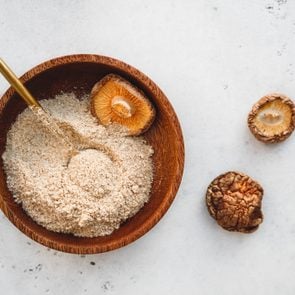Here are 5 Potential Benefits of Lion’s Mane Mushrooms
Updated: Jun. 29, 2021
Lion's mane mushrooms are a type a fungus with an umami flavor and a meat-like texture that deliver nutrients like iron and potassium. Learn about their benefits, risks, and uses.
The growth of plant-based products
Whether you’re an omnivore, vegan, or something in between, you’ve probably noticed a profusion of meatless products on supermarket shelves.
The market for plant-based meat substitutes is booming, growing 17 percent between 2014 and 2018, according to market research company Statista. And demand is still on the rise.
Though more and more people are open to meatless proteins like seitan and sea moss, there’s an ongoing hunt for plants that offer a more meat-like texture. There’s also a growing interest in medicinal plants, according to market research company Technavio.
All of that makes the market ripe for hearty fungi like lion’s mane mushrooms. They’re sold as everything from mushroom “steaks” and mushroom jerky to powders and supplements.
“People are always looking for a quick fix, and mushroom supplements are some of the newest and most innovative,” says Amy Gorin, a plant-based registered dietitian nutritionist and owner of Plant-Based Eats in Stamford, Connecticut.
Low in calories and packed with potential health benefits, this fungus could be a fun, nutritious addition to your diet.
Here’s everything you need to know about lion’s mane mushrooms, including the benefits, risks, nutrition, and how to eat them.
What is lion’s mane mushroom?
Lion’s mane, also known as Hericium erinaceus, is a mushroom with a long history of medicinal and culinary use in Asia. It’s blond and shaggy—hence the name “lion’s mane.”
Though the ragged, fleshy white fungus grows naturally on dying wood, you can now find lion’s mane mushrooms in processed supplements, extracts, and powders. Whole lion’s mane mushrooms also have a chewy texture and umami flavor that makes them an effective meat substitute in many dishes.
Lion’s mane is often marketed as a healing ingredient, but its benefits in that area aren’t well understood.
“Medicinal mushrooms have been used and revered for centuries in traditional Chinese medicine, [but] more human studies are needed for safety, efficacy, and proper dosage,” says nutrition expert Vicki Shanta Retelny, RDN, host of the “Nourishing Notes” podcast.
Mushroom nutrition facts
Lion’s mane mushrooms have a similar nutritional profile to many other mushroom varieties. In general, fungi are low in calories and fat, with a sizable helping of antioxidants and minerals, such as iron and potassium.
One cup (70 grams) of the average raw mushroom contains the following nutrients:
Calories: 15.4
Protein: 2.16 g (4 percent recommended daily value, or DV)
Fat: .24 g (0 percent DV)
Carbohydrates: 2.28 g (0.8 percent DV)
Fiber: 0.7 g (2.5 percent DV)
Calcium: 2.1 mg (0 percent DV)
Iron: 0.35 mg (2 percent DV)
Potassium: 223 mg (4.7 percent DV)
Magnesium: 6.3 mg (1.5 percent DV)
Phosphorus: 60.2 mg (4.8 percent DV)
Varieties
There are several varieties of lion’s mane mushrooms. The fungus is native to Asia, Europe, and North America. In North America, it is common to find at least three distinct species: Hericium erinaceus, Hericium americanum, and Hericium coralloides.
All three types have a similar look and nutritional profile. They are also all edible. Here’s what the experts have to say about these shaggy mushrooms’ health benefits.

Lion’s mane mushroom benefits
In general, mushrooms are healthy because they deliver disease-fighting phytochemicals in a tasty, low-calorie package. Lion’s mane mushrooms offer all the nutritional benefits of other mushrooms, including plant-based iron and other essential minerals.
Some research suggests that lion’s mane might offer more health perks than other common mushrooms, such as portobello or shiitake.
“Research on the health benefits of lion’s mane mushrooms is preliminary, and more studies need to be done,” says Gorin. “From the research that we do have, there may be benefits for cognitive function and gastritis (inflammation of the lining of the stomach).”
Though lion’s mane mushrooms are nutritious, there is little evidence to support claims that they boost energy, prevent disease, or speed up weight loss.
“Although lion’s mane may have benefits, by no means is adding them to your diet a magic elixir,” says Shanta Retelny. “More human studies are needed.”
Provides a plant-based source of iron
A one-cup serving of lion’s mane provides about 2 percent of your recommended daily value of iron.
Plant-based sources of iron are vital for vegetarians and vegans, according to Gorin. That’s because most high-iron foods are also animal products—think beef, chicken, and oysters.
Since an iron deficiency can lead to anemia, consuming plant sources of iron, like lion’s mane, sea moss, and chia seeds, can help you keep your levels in the safe zone.
Might boost mental health
“Lion’s mane is believed to be beneficial for … fending off depression and anxiety,” Shanta Retelny says.
As with the majority of research on lion’s mane, however, studies linking the mushroom to mental health benefits have mostly been done in animals. That’s a good start, but in no way do animal studies prove they’re useful in humans. For that, we need human studies.
May protect against dementia
According to Shanta Retelny, lion’s mane mushrooms may have a beneficial effect when it comes to dementia and Alzheimer’s disease.
That could be because lion’s mane mushrooms contain plant compounds known to stimulate new brain cell growth, according to research published in the International Journal of Medicinal Mushrooms.
Gorin adds that in one small study of older Japanese adults with mild dementia, taking 1,000 milligrams of lion’s mane three times per day for four months seemed to improve mental clarity. “Compared to the placebo, these adults saw cognitive increases—but the benefits began to diminish within a month of termination of the treatment,” she says.
So while lion’s mane mushrooms might improve your mental health, research is still too limited to confirm precisely if and how this works. More studies are necessary to recommend supplementation for specific mental health conditions.
Could soothe abdominal pain
“Research shows that lion’s mane may help with upper abdominal pain for people with gastritis,” Gorin says.
In a mouse study published in the International Journal of Medicinal Mushrooms, scientists pinpointed a compound in lion’s mane mushroom extract that can fight against gastric ulcer activity.
Just keep in mind that this study was done in mice, not people. More research is necessary to determine if the mushroom extract would have the same effect on humans.
Might aid weight loss
“There is very preliminary research to show that lion’s mane mushrooms may have weight loss benefits,” Gorin says. She explains that in a study of rats on high-fat diets, lion’s man supplementation resulted in a decrease in body weight gain.
A 2018 research review published in the journal Molecules suggests that regularly eating mushrooms can help support weight loss and prevent weight gain.
And an earlier study, published in Bioscience, Biotechnology, and Biochemistry, found that mice fed a high-fat diet along with lion’s mane extract gained less weight than mice who didn’t eat lion’s mane. Plus, they had lower triglyceride levels, which suggests lions mane may be beneficial to the heart.
But before you order a bottle of lion’s mane supplements, remember that most studies have been done on animals. Only controlled human studies can confirm the actual effect of lion’s mane mushrooms on your weight-loss efforts.
Shanta Retelny adds that she is “always cautious about weight loss claims, especially on supplements” because these products are not regulated by the Food and Drug Administration.
That means any old supplement company can slap on label that says “Hey, our stuff helps you lose weight!”—even if there’s no proof.
Risks and side effects
Lion’s mane mushrooms are generally considered safe and healthy. As with any medicinal plant, lion’s mane mushrooms may interact with supplements or drugs.
If you are taking an anticoagulant or antiplatelet drug (such as aspirin or warfarin), Gorin says lion’s mane supplements could increase your risk of bleeding. That’s because lion’s mane contains a plant compound called hericenone B. According to a report in the science journal Phytomedicine, this compound can inhibit blood clotting.
Lion’s mane can also increase your risk of hypoglycemia, or low blood sugar, if you combine it with certain antidiabetes medications or supplements (like garlic, ginseng, and psyllium), according to Gorin.
The supplement’s hypoglycemic effect means it has potential for blood sugar management. That’s what researchers found when they tested lion’s mane on rats with diabetes.
Reporting in BMC Complementary Medicine and Therapies, the researchers say that after 28 days of taking powdered lion’s mane, the rats had lower blood sugar levels. It’s promising, but scientists will need to conduct human studies to determine if the supplement is effective and, more important, safe for people with diabetes.
Shanta Retelnty recommends avoiding lion’s mane if you are allergic to any other mushrooms.
How to use lion’s mane mushrooms
“Lion’s mane mushrooms are used raw, cooked, dried [powdered], and in teas,” says Shanta Retelny. There are many ways to incorporate this nutritious fungus into your diet.
Here are a few ideas:
- Swap a meaty side dish or entrée for lion’s mane slices sauteed in butter. Gorin says the taste and texture are similar to crab and lobster.
- Saute lion’s mane slices in olive oil, soy sauce, and seasonings before adding to your favorite stir-fry.
- Add to one of these delicious mushroom recipes.
- Lion’s mane tea can be purchased from health food stores or some supermarkets. Steep according to instructions on the label.
- As a dietary supplement, lion’s mane powder can be added to smoothies or soups. However, it is best to talk to your doctor before ingesting a new supplement, especially if you take prescription medications.





















